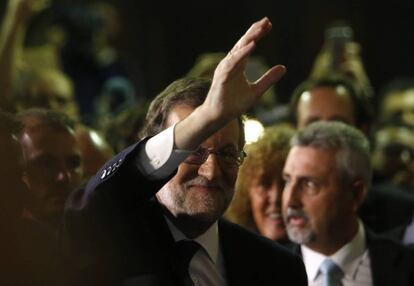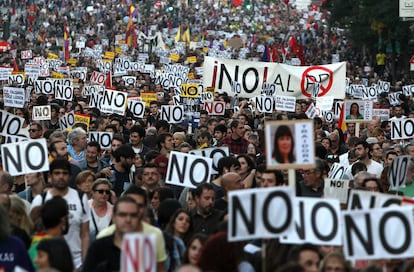Rajoy becomes Spain’s new PM after a 10-month stalemate
But a crowd of 6,000 protested the new “illegitimate government” outside Congress in Madrid

Mariano Rajoy was voted in as the new prime minister of Spain at the second round of a congressional vote on Saturday night.
Rajoy, of the Popular Party (PP), won a second term in office after leading a caretaker government for 10 months in the wake of inconclusive elections that broke the two-party system, introducing unprecedented fragmentation in the lower house.
When people mobilize, that is not a threat to democracy
Podemos leader Pablo Iglesias
As expected, the PP nominee won 170 favorable votes from his own party, from the reform group Ciudadanos and from the regional Canaries Coalition.
But his victory was only made possible by the fact that 68 Socialist Party (PSOE) deputies abstained, following their own party’s instructions. Even so, 15 Socialist congressmembers entered a conscience vote against Rajoy, evidencing the deep fracture within the PSOE.
In all, 111 deputies voted against Rajoy in the 350-seat chamber.
Rajoy’s minority government will have to reach vote-by-vote agreements in a hostile chamber, a fact that the new PM acknowledged right after the vote.

“I think there is still a lot of work ahead of us,” said Rajoy in his first statements. “We will try to seek agreement and understanding with everyone.”
But then he issued a warning to other members in Congress who have pledged to fight his tenure every step of the way.
“I think we are a great nation and a great country, and I hope this will not simply be an investiture session, but that we will be able to do what other European countries with no majorities do: try to govern and work together.”
His words were mostly aimed at the anti-austerity Podemos and the United Left, whose representatives warned ahead of the vote that they cannot be counted on to cooperate during the coming term.
Carolina Bescansa, a deputy for Podemos, declared that “today, a new bloc has been created” in reference to the PP, PSOE and Ciudadanos.
Over 1,000 police officers were sent to watch over a demonstration
Meanwhile, the PSOE issued a statement saying that “from this very moment, the PSOE pledges to head an opposition that will revert four years and 300 days of partisan and harmful policies.”
Protest outside
But as lawmakers were casting their votes, a large crowd had congregated outside Congress to protest what it viewed as a breach of democracy.
The Surround Congress demonstration attracted an estimated 6,000 people according to the National Police. Protesters, who ended the rally at around 8pm, claimed that the PSOE’s passive support for its traditional rival, the PP, is a betrayal of voters’ wishes – or, in the words of protest organizers, “a mafia coup.”
Marchers protested “the illegitimate government” being created within the walls of Congress.
Over 1,000 police officers were sent to watch over a demonstration that was organized by a group called Coordinadora 25S and sponsored by radical left-wing parties who have promised to “bring the fight into the public squares.”
Protesters waved placards showing Rajoy with a smoking gun in his hand. Former Socialist leader Felipe González, who was Spain’s longest-serving prime minister and publicly supported abstention as a last resort to end the impasse, was also depicted as a gunslinger in the posters.
Asked about the protest, Podemos leader Pablo Iglesias denied that it was a threat to democracy. “When people mobilize, that is not a threat to democracy,” he said. “A lethargic society is a threat to democracy.”
English version by Susana Urra.
Tu suscripción se está usando en otro dispositivo
¿Quieres añadir otro usuario a tu suscripción?
Si continúas leyendo en este dispositivo, no se podrá leer en el otro.
FlechaTu suscripción se está usando en otro dispositivo y solo puedes acceder a EL PAÍS desde un dispositivo a la vez.
Si quieres compartir tu cuenta, cambia tu suscripción a la modalidad Premium, así podrás añadir otro usuario. Cada uno accederá con su propia cuenta de email, lo que os permitirá personalizar vuestra experiencia en EL PAÍS.
¿Tienes una suscripción de empresa? Accede aquí para contratar más cuentas.
En el caso de no saber quién está usando tu cuenta, te recomendamos cambiar tu contraseña aquí.
Si decides continuar compartiendo tu cuenta, este mensaje se mostrará en tu dispositivo y en el de la otra persona que está usando tu cuenta de forma indefinida, afectando a tu experiencia de lectura. Puedes consultar aquí los términos y condiciones de la suscripción digital.








































